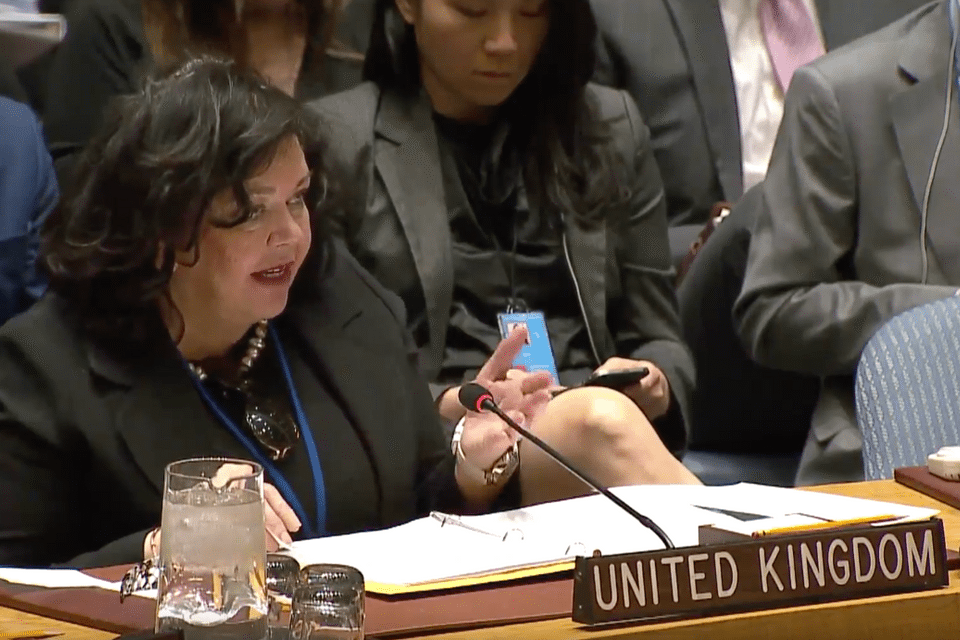UK stands with Colombia in support of Peace Agreement
Statement by Ambassador Karen Pierce, UK Permanent Representative to the UN, at the Security Council Briefing on Colombia.

Thank you very much Mr President.
It is an honour to have their Excellencies the Vice-President and Foreign Minister with us today.
I too would like to open by expressing my personal condolences to our Côte d’Ivoire colleagues, to Bernard’s family and friends and on behalf of the British government and the British people to our friends in Côte d’Ivoire, the government and the Côte d’Ivoirian people as well. It is a great loss and we send you all our condolences and sympathy.
Turning to Colombia Mr President, it is very good to have the SRSG back here. He and I have known each other for a very long time. I’d like to thank him for his work and also the work of all your team on the ground.
This is a historic peace agreement. I think Colombia is to be congratulated on taking this tremendously important and historic step. It ended 50 years of conflict. This is a huge achievement and it serves global inspiration for others. It shows what can be done for peace when you have bold leadership. The United Kingdom knows from Northern Ireland that implementation of these sorts of agreements is very challenging and I think it has proved to be no less challenging for Colombia. The United Kingdom is proud to stand with Colombia in support of the implementation process – and you can rely on us to do so over the months and years ahead.
I was very interested to hear from the SRSG of some of the remarkable progress that there has been over the past three months. What he had to say about the ruling and about the banks is an important step forward and we welcome also the congressional elections in March that saw FARC participate in Colombia’s democratic process for the first time. Mr President, we believe that this is indeed a key point in the FARC’s political transformation and a truly remarkable achievement in the short time since the signing of the Peace Agreement in 2016.
We also welcome the progress there has been in implementing the Peace Agreement, notably the structures for truth, justice and reparations for victims of the conflict and the activation of the Special Jurisdiction for Peace, and the Special Unit for the Search for missing persons are two very important steps.
On the resumption of talks with the ELN, we very much welcome the return to dialogue but I would also like to turn to the very real challenges that remain to the implementation of the Peace Agreement. These challenges include continued insecurity in some of the areas affected by the conflict and they include violence and threats against former FARC members. The protection measures, including FARC participation in close protection of their leaders are key steps in helping address this. It is vital that the Government’s strategy for security guarantees is properly resourced and coordinated with the police, the Fiscalia (Attorney General’s Office) and judicial authorities.
I was reassured by what the SRSG had to say about the arrest of the FARC leader and we would like to echo those calls for calm and for ensuring that the provisions of the peace agreement continue to be followed. One of our other concerns Mr President, is also the levels of violence against community leaders and also human rights defenders. It is very good that the Special Investigative Unit in the Fiscalia will be able to investigate these attacks. The launch of Plan Horus represents is a bold and comprehensive response to security challenges in vulnerable areas and we look forward to seeing an ongoing and coordinated stabilisation approach with police and civilian agencies. I think this will be vital for long-term stability.
Turning to the Office of the High Commissioner for Human Rights, we would like to thank those staff and Mr Todd Howland in particular for his leadership of the office and we welcome the appointment of his successor, Mr Alberto Brunori. This office has played a key role in supporting the peace process and we will continue to watch its work very closely.
In the next weeks and months, it is vital that reintegration projects are active in all 26 Areas for Training and Reintegration and this will help prevent further former FARC members from joining dissident groups. We look forward to seeing resources unlocked, and timelines accelerated, for crop substitution, rural development and reintegration of former combatants.
The United Kingdom encourages further progress in the implementation of the Peace Agreement over the coming months to support continued progress towards a sustained peace in Colombia. Colombia can definitely count on the United Kingdom’s continued and deep support.